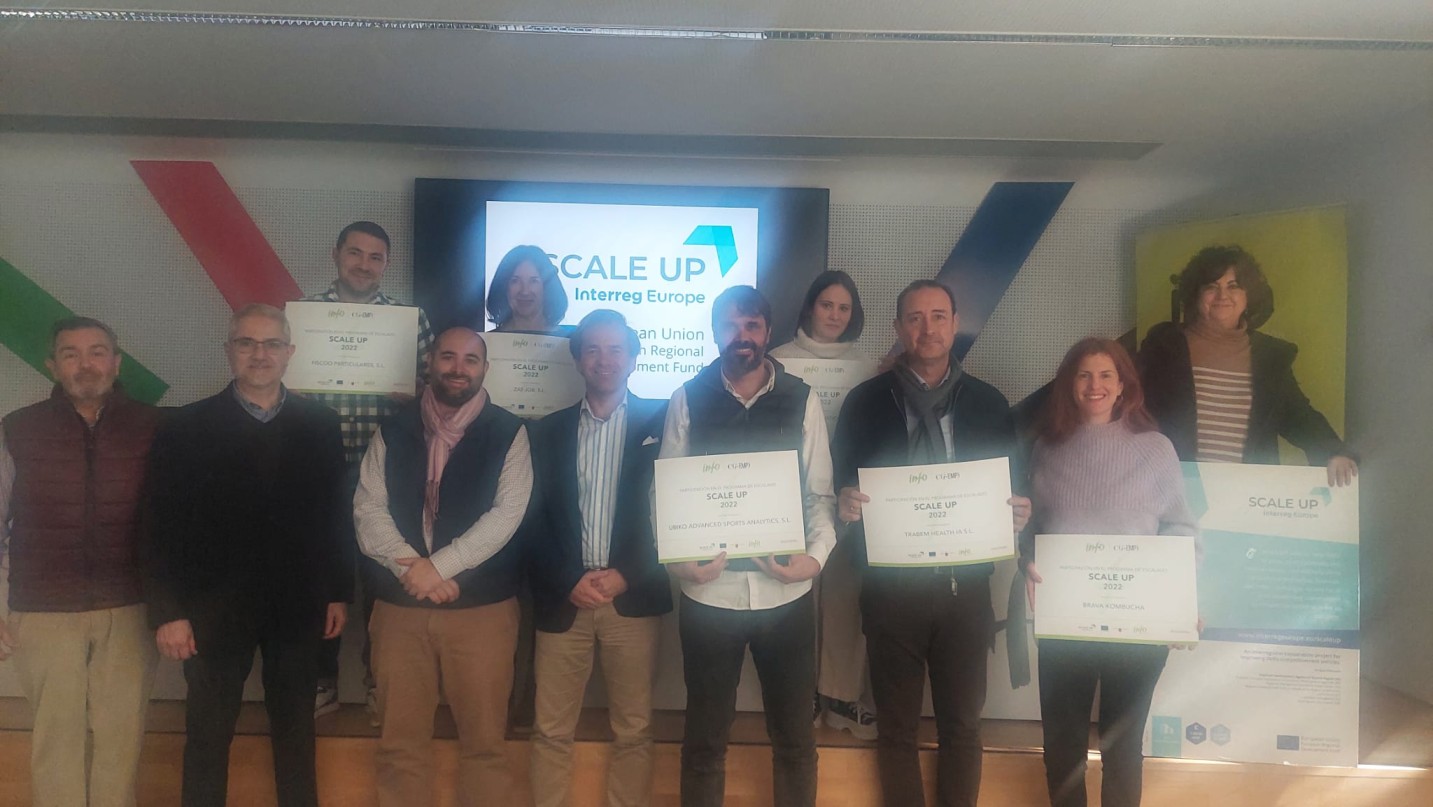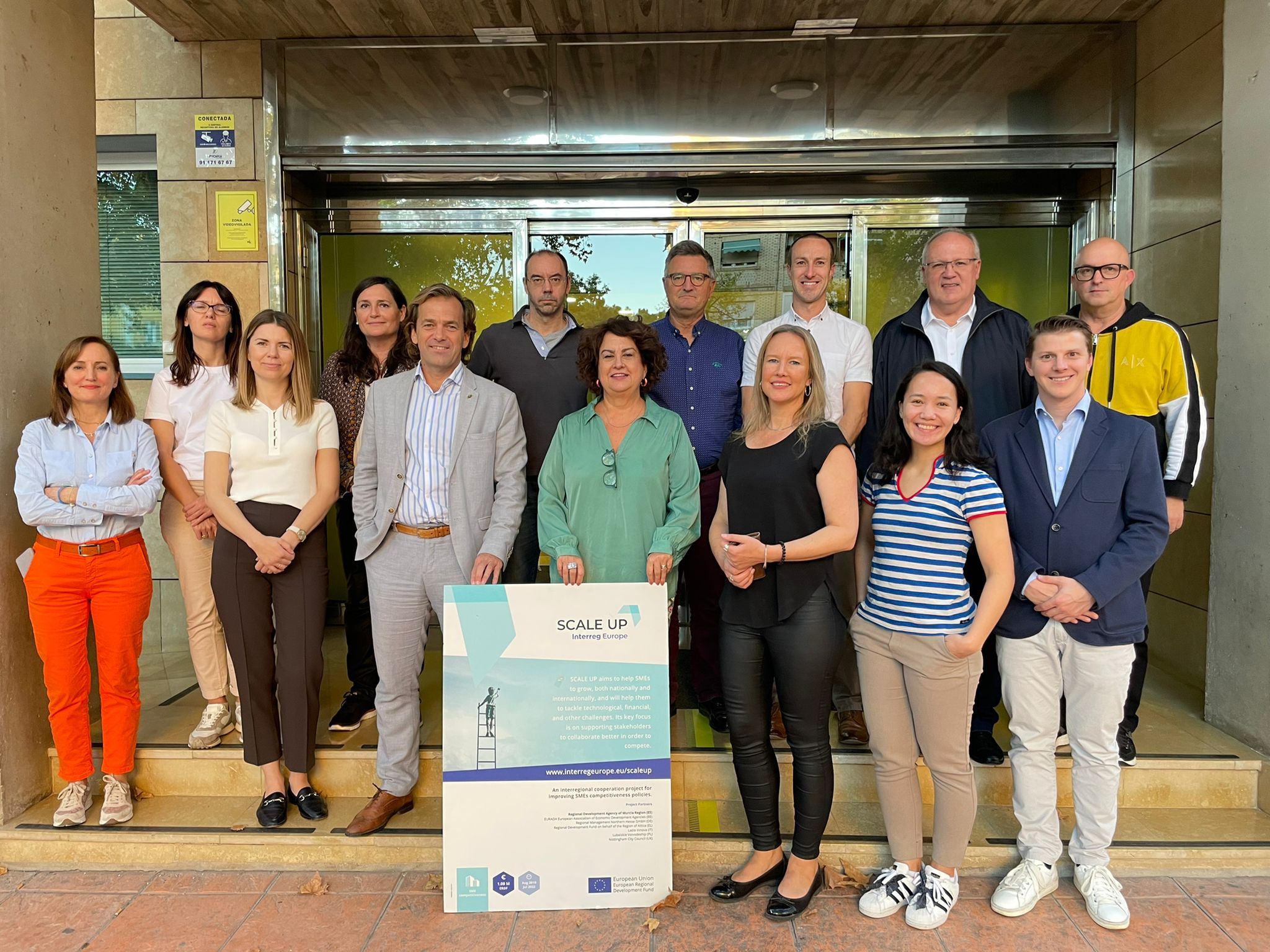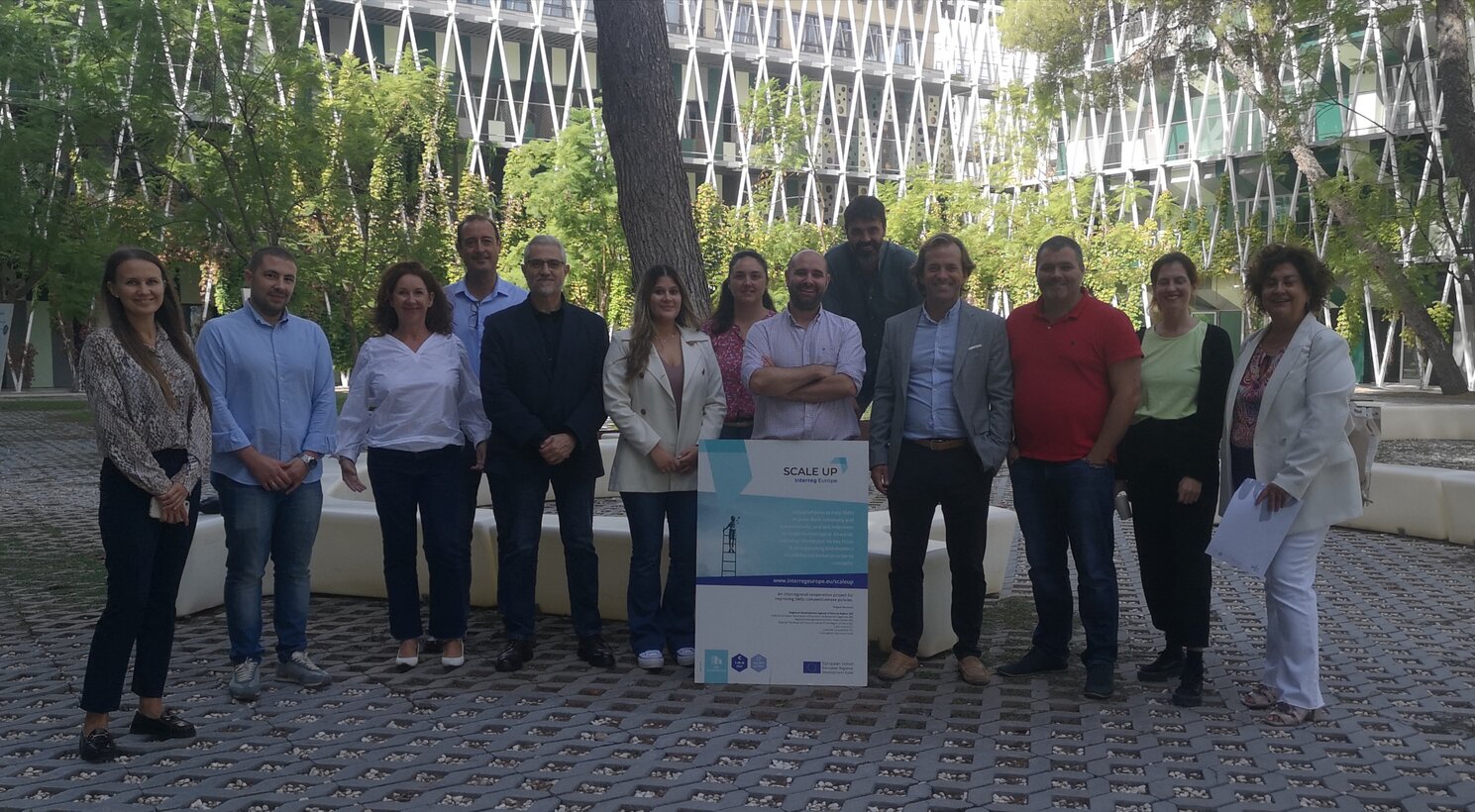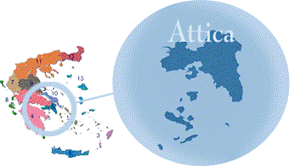
Interreg Scale Up’s lasting impact
Interreg Scale Up consortium is proud to share with you the improvements it has made on the various policy instruments selected.
SCALE UP plans to improve policy instruments supporting SMEs capacity to growth in national and international markets. Main objective of SCALE UP is to contribute to European competitiveness and accelerate regional economic growth through the improvement of 6 policy instruments linked to business growth and robustness. SCALE UP represents six EU regions (plus Advisory partner) with different stages of development in terms of industry SMEs scale up but common needs.
The following scale-up key areas have been identified to work in the project: New business collaborative models; Improve collaborative culture between science, technology, innovation & industrial companies; Regional smart specialisation sectors in form of partnerships/networks/clusters; use & adaptation to new technologies and accessing to finance tools.
SCALE UP work plan has been designed following a coherent and integrated approach where all the activities are interlinked and framed in a logical path. The approach starts with an analysis of partners’ local situations to identify valuable practices which will be then reviewed (through site visits and peer reviews) in a perspective of transfer and adaptation, to design and implement 6 action plans.
These stages are backed up by structured activities and a learning process to improve the level of development of business scaling policies and knowledge of key actors (Interreg. Policy Learning Events, brokerage events, roundtables, open innovation seminars, etc). Stakeholders Action Groups will be created in each region and main local & regional actors will be actively involved in the whole interregional learning process.
Scale-up business is part of the objective of supporting SMEs growth, to support regional authorities to respond adequately to key obstacles that obstruct industry sector on their path to growth taking into account the conditions of the current worldwide markets.
€1,272,350.00
SME competitiveness
ERDF Operative Programme of Murcia Region includes TO3 Improve competitiveness of SMEs. Within its OE.3.4.1; there is an action devoted to the support of productive investment and boost competitive advantages for regional companies, through projects that will aim creation, enlargement and improvement of their facilities and quality
On the other hand, within OE.3.4.2, there is an action devoted to the support of initiatives fostering business collaboration, especially on RIS3 strategic sectors. On it, business collaborative projects will be identified and boosted. There are in addition several actions that foster internationalization of SMEs through dissemination of existents tools, clustering, training, orientation, consolidation measures, etc.
This policy envisions to take advantage of complementarities among companies to deliver new R&D&I projects and increase internationalization of their products and services. It aims to increase number of SMEs considered as innovative through business association.
Help the SMEs to be able to set alliances with main manufacturing companies from principal European industry sectors it is not specified at Murcia policy instrument. SMEs can provide innovation to large industries and through that relation contribute to the creation of new R+D+I project and to the increase of innovation in regional economic sectors. SME consolidation and scale-up derived by business symbiosis should be fostered within Murcia ERD policy.
Cluster networks are able to increase the collaboration between SMEs as well as between SME and R+D institutions, which enhances the innovation potential of every actor involved.
Thus the program is targeting the following:
• Joint initiatives for enhancing the collaboration between SME and Institutions such as research facilities
• Information networks between companies, universities and other partners who are organized in the cluster network
• Technology transfer between companies and R+D institutes
• Involve external knowledge in the innovation process of companies
• The joint usage of technical resources to enhance innovation
The funding includes the following four phases of cluster development:
• Preparation
• Starting
• Continuation
• Further Development
The policy instrument shall be improved because the funding of cluster networks does not address any measures to explicitly encourage SMEs to engage in the industrial renewal. The objective to fund cluster networks to stimulate innovation processes in SME is very broad and general. To strengthen SMEs in the industries relevant for our region, special instruments are necessary, which focus the activation, collaboration, growth and innovation processes of these companies and bring them into international cross-sectoral knowledge exchange. Those tools that might be most adequate and relevant to reach this aim, needs to be evaluated in this project.
The main objective of the Attica ROP, TO 3 & Investment priorities (IP) 3c & 3d is promoting entrepreneurship, in particular by facilitating the economic exploitation of new ideas and supporting the creation of new businesses. Its character is that, within the framework of these IP, actions will be promoted to enlarge the SME’s business side & the adaptation of them also to areas of high added value, with a view to facilitating the economic exploitation of new ideas, business discovery & networking of SMEs, in and out of Greece. In addition IP 3c will try to assist on SMEs how to improve their business size: Improve collaborative culture between science, technology, innovation & industrial companies system. The policy is among others a solution to the high unemployment rates (~22%) in the region. It is of a high priority for the region, as also the 2 IPs are included in the RIS3 of Attica. Funds that are connected to the IP 3d work also to the direction of attracting new investments & funding schemes in reliance with internationalization. Commercial relations with companies from abroad & strategic industrial projects that could contribute to completing the value chains of the regional industry are also main features of the policy instrument & should be improved. The 2 combined IPs selected need to be improved sharply, as the region & especially the city of Athens, faces enormous structural developing & employment problems due to the continuing economic crisis in Greece.
The actions concern the support to SMEs for the purchase of services for technological innovation, strategic, organizational and commercial, implementation of research and development activities of SMEs in connection with other subjects of industry, research and university.(1.1.3)
Furthermore, the realization of proof of concept, the industrialization of research results and the application of innovative solutions will be financed. Support for collaborative R & D activities for the development of new sustainable technologies, new products and services (carried out by companies in connection with other industrial, research and university entities, and existing public-private aggregations, such as Technological Districts, Public-Private Laboratories and Innovation Poles)(1.1.4)
The repositioning of regional production systems and specific supply chains will have to be essentially directed towards four directions:
a) the differentiation towards new technological-productive development areas starting from the issues related to the environment, mobility, health;
b) development of products and advanced production functions, such as design, research, patents, quality controls, logistics and distribution, communication and marketing, finance;
c) international opening of the value chains, which is not exclusively dedicated to the procurement of raw materials and export of finished products;
d) the growth of scientific and technological content in "traditional" productions; (3.3.1)
ROP 2014 – 2020 is detailed by specific objectives that are relevant to the project, which are set in Priority Axis 3 related to: Better conditions of SME development, Increased level of foreign trade in the SME sector, Increased use of innovation in SMEs. Therefore their detailed measure that are relevant to the project are e.g. 3.4. Adaptation of the Business Environment Institution’s offer to the market needs, 3.5. Advisory Voucher, 3.6 Economic marketing, 3.7 Increased competitiveness of SMEs. LuVo has selected key sectors that contribute the most economic development of the region and influence for their competitive advantages. The targeted support regional smart specializations: bioeconomy, medicine&health, low carbon-emission energy and IT&automation.
Improvement needs in the policy instrument relevant for the project include: 1) stimulating the level of entrepreneurship on regional, national and international markets 2) strengthen business development and growth through economic promotion, investment attractiveness, access for professional services and expertise 3) support SME by expanding beyond the local market and establishing cooperation to increase their competitive position 4) strengthening the business environment institutions and public administration bodies open for innovations 5) increasing added value in the economy, especially in the smart specialisation areas, (5) enhancing better ROP LV 2020 implementation.
The main objective of the D2N2 ESIF priority Axis 3 (PA3) are to;
- Support entrepreneurial culture across the area, reducing barriers to such
- Provide high quality support to help established SMEs to grow further, with an emphasis one bespoke growth plans & integrated support
- Support higher levels of SME exports
- Increase the contribution to the economy of SMEs within priority sectors & their supply chains
It has 3 investment priorities. They promote start up & growth of innovation, the creation & extension of advanced capacity for products services & development, & growth, including in new markets & innovation.
The strategy makes one mention of scale up as an ambition to support businesses. A recent funding call for PA3 expanded on this. This has a focus on increasing productivity through Scale up programmes helping small but productive firms to grow & become investment ready
It does not define what Scale up is.
Business support across the area is coordinated by the D2N2 Growth Hub. The Growth Hub helps SMEs through a diagnostic process, to identify needs, & be ready to access relevant support. It is a source of knowledge of local programmes of business support. Nottingham C.C. manages it on behalf of partners.
In 2017, it commissioned a small scale up project. 25 SMEs took part.
Its procurers did not know what scale up activities makes the difference for SMEs. This Interreg project will change that ensuring SMEs get help that works

Interreg Scale Up consortium is proud to share with you the improvements it has made on the various policy instruments selected.

Last 26th January, our lead partner, INFO Murcia, closes the scaling up programme 2022.

SCALE UPproject held its final conference in Murcia, Spain, last 18 November 2022.

The SCALE UP final conference will take place on Friday 18 November 2022 in Murcia

Last 6 of October 2022, our lead partner INFO Murcia organised a face-to-face workshop focused on Digital Busines models.

Our British collegues are supporting companies on their growth journey and contribute positive impacts to the local economy.

The Lubelskie Region administration and the universities want to combine their potential of knowledge and experience in order to support SMEs.

The action plan of Attica region will be implemented in 2023

INFO Murcia, lead partner of SCALE UP, just lunched a new programme which aims to facilitate the scaling up process of regional SMEs.

The fifth newsletter of the SCALE UP project has been translated into all the languages of the project partners. The SCALE UP consortium is composed of 7 partne...